Around the world with The Bear – Part Nine
The King of Every Kingdom – Around the world on a very small motorcycle
With J. Peter “The Bear” Thoeming
Previous: There was more to discover yet about India, and about XL250s if they’re not treated properly. In this instalment The Bear also heads to Pakistan.
Our stay with Paul’s family in Chandigarh was enjoyable – they were non-orthodox Sikhs, very middle class and very kind. We also had some more maintenance to do.
Charlie’s bike was still showing a slight oil leak at the head gasket and my shift drum stopper bolt had shorn through. A friend of Paul’s got his father to make us a new one out of surgical steel, far better than the old with a small ball bearing, and Paul’s brother JP arranged for me to go to the hospital and have a nasty boil on my arm lanced. You know, housekeeping.
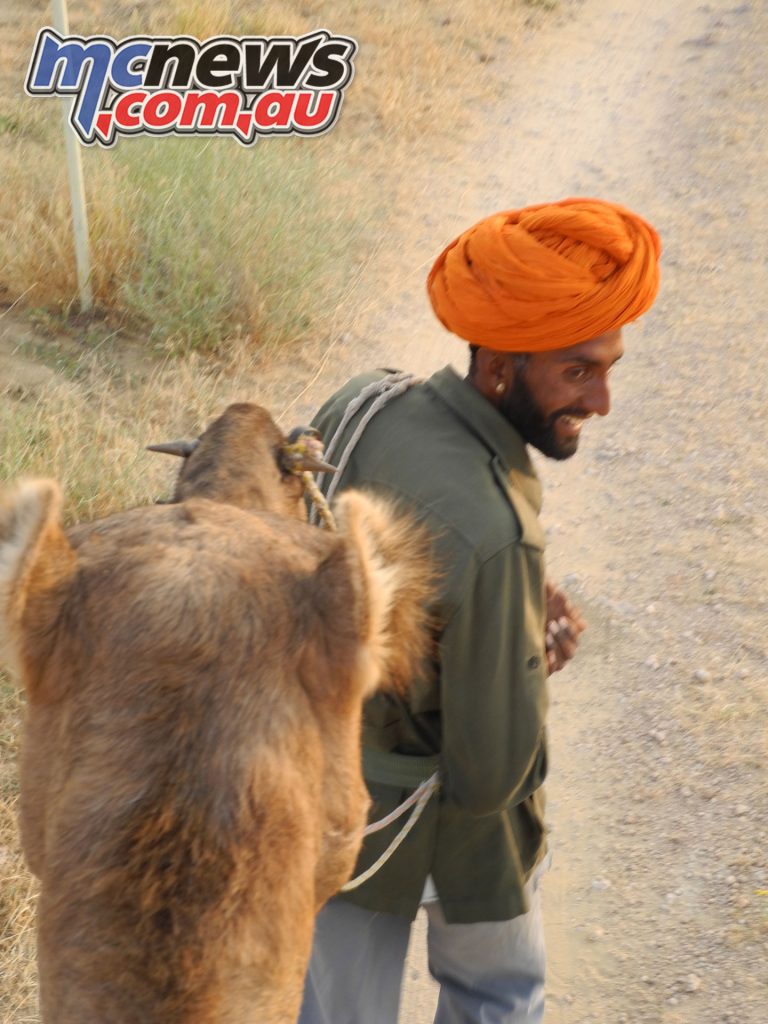
By the time we left, the local boys had become rather dissatisfied with their bikes. The Yezdis they were riding, locally built Jawas, lagged rather noticeably behind the Hondas in sophistication. We left them trying to devise a way of improving the rear suspensions to XL standards. The Grand Trunk Road swallowed us, on our way to Jammu and Kashmir.
At a truck stop on the main road we finally managed to get a really hot curry. Indians tend to be very solicitous of Europeans—they don’t believe we can eat their curries.
Should you attempt to order one you will usually be served a boiled egg on toast instead. In this case there was no option, they only had one pot. Charlie and I, being experienced curry consumers, amazed this lot by going back for second helpings.
Just before Jammu we found a back road that would cut a few miles off the run to Kashmir, and followed it up into the hills. We also found that Charlie’s engine was covered in oil … he’d done the tappets in Chandigarh and only finger-tightened some of the bolts. Then my clutch started to slip.
We still managed to enjoy the little back road, surrounded by fantastic cliffs carved out of the soft soil by rapid erosion. A bit dangerous, though. I can well imagine entire sections of roadway disappearing downhill in a rainstorm.
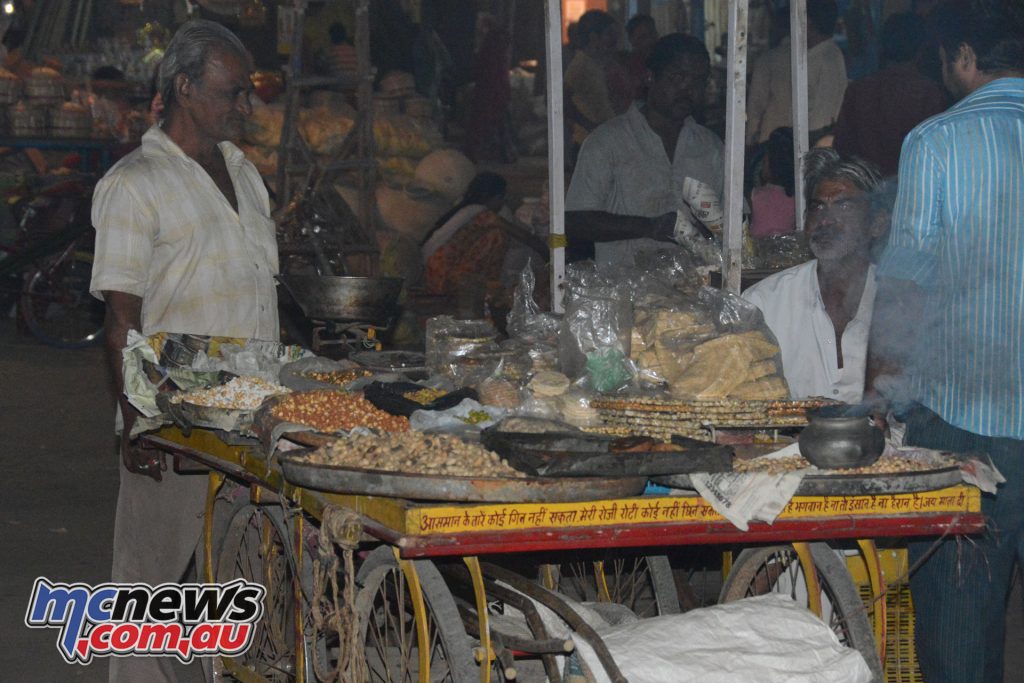
Staying at the Green Hotel in Udampur seemed like a good idea at first, until we discovered that there was no water for showers or washing and the room next to ours was being used for a party by a crowd of very drunk Sikhs from a nearby army base.
Sikhs are not allowed to smoke, but boy do they drink… Charlie refused to pay more than half of the bill in the morning and read the riot act to the proprietor in a way I still admire today.
The road to Kashmir is rather like a badly tarred motocross track, and about as much fun, which is to say that we enjoyed it as long as there were no trucks trying to run us off the edge of the road. Sometimes there was a drop of hundreds of metres (I kid you not) straight down from the edge of the road to the river, and no safety barriers.
Some of the mudslides across the road had been here so long they had been given names, on little concrete markers. I suppose it’s easier than doing anything about them…. Just before we got to the 2.5km tunnel that leads to Kashmir we passed a military convoy of well over a hundred trucks.
The tunnel itself is a nightmare with very poor orange lighting, no reflectors and icy drips from the ceiling. Remember we were on XLs, with their notoriously dim headlights.
Kashmir is a beautiful place and it’s easy to see how it gave rise to the legend of Shangri-La, the paradise high in the Himalayas. Everything is green, there are majestic poplars lining the roads and the ground seems to ooze fertility. It has its problems, though, for the visitor. Kashmir is a holiday resort for thousands of people from India and is set up accordingly.
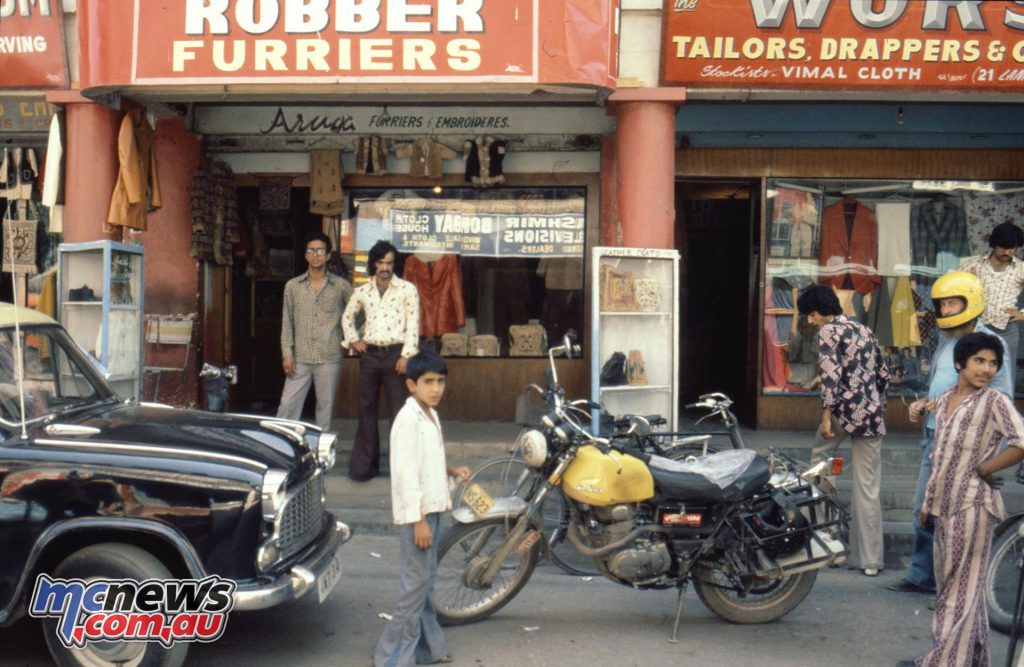
The touts trying to sell you souvenirs, a hotel room, a bed on a houseboat or leather clothing can become very trying. They nearly threw themselves under the wheels of the bikes, business cards clutched in their hands, when they saw us coming. Ignoring them, we stayed in the faded Victorian splendour of Houseboat Golden Rod, our every wish catered for. Well, nearly.
The Mughal gardens and floating palaces are worth seeing and shopping is good. We had some leather clothes made by Aruga The Robber (his shop sign) very cheaply, but alas not very well.
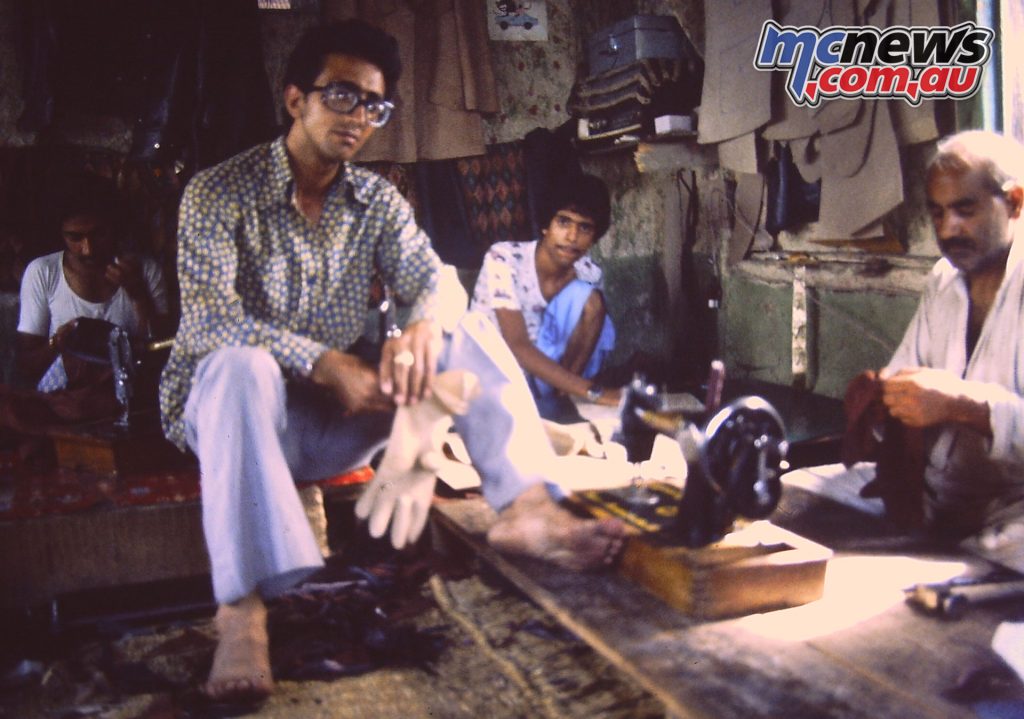
The road up is also the road down. We played chicken with another military convoy, buzzed through the heavily fortified town of Jammu— it’s near the Pakistani border—and back out onto the plain. A South African bloke we met was travelling on a Dutch passport because South Africans weren’t allowed to enter India.
He had a two-day-old Indian Enfield 350 with which he’d covered 200km. In that distance he had broken the throttle and front brake cables as well as losing the battery cover and the bolt holding the exhaust in place. He didn’t think that was bad, and anyway there were bike repair shops everywhere.
It would have been an understatement to say that we were hot, and we attempted to order a couple of bottles of beer that night to go with our dinner. The waiter waggled his head and indicated that this was in fact a “dry day”. A number of Indian states have various kinds of prohibition, and we were unable to buy beer.
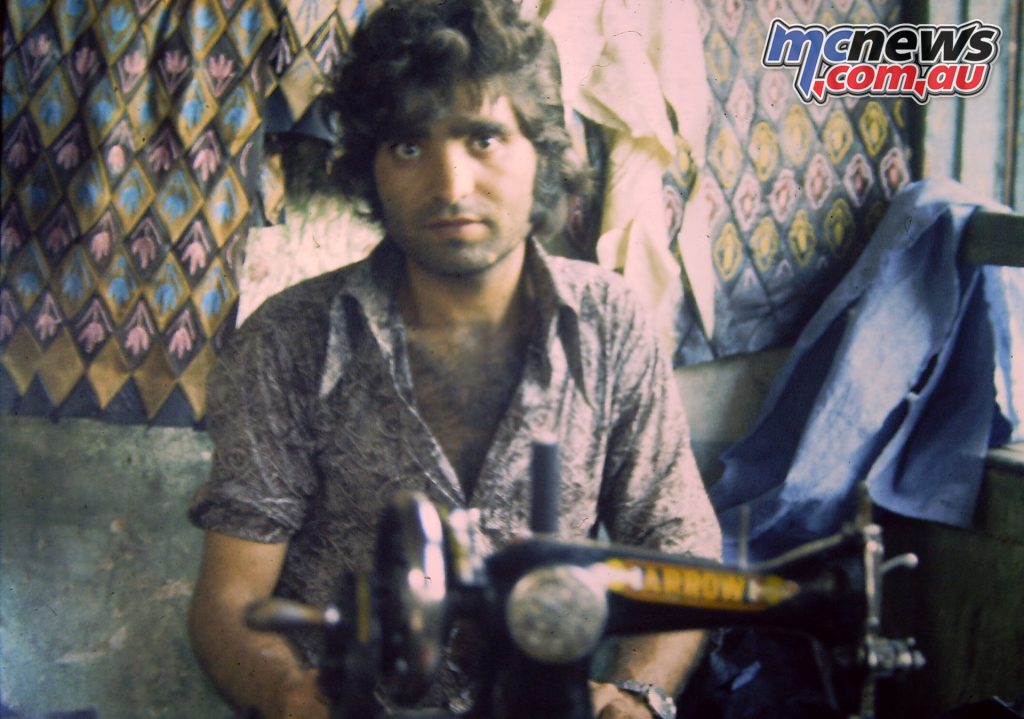
In at least one state you have to register as an alcoholic to get a drink at all. “Strictly for medicinal purposes…”
I looked the waiter in the eye and said, very slowly and with minimal inflection, ‘I don’t think you heard me. We would like two bottles of beer…’ He folded and sent the eighty-year old ‘boy’ out for the amber nectar. When he returned and placed the bottles on the warm marble tabletop, they were so cold that one exploded. He shrieked and ran and we made do with one bottle.
There was an enormous crowd around when we loaded the bikes up in the morning. In a country of crowds, where foreigners seem to draw them like honey does bees, you get used to them. This one was extraordinary though—commerce ceased all over town as everyone watched us. We had to deliberately tread on people’s toes to get to the bikes. It was scary, even though there wasn’t the slightest feeling of hostility.
A little later, the skies opened and the monsoon proper had begun. Within a few minutes the carriageway was 15 to 20 cm deep in water—muddy water. This meant that not only was the rain obscuring our sight of the way ahead but the potholes were invisible too.
In the Amritsar Youth Hostel we met Jajime, a Japanese chap who’d ridden a Yamaha DT125 from Calcutta to Kayseri in Turkey and was now on his way back. He thought the DT was ‘perhaps a little slow for the long roads’.
While in Amritsar we duly admired the Golden Temple, spiritual home of the Sikhs. One distinguished-looking gentleman took my hand at the entrance to the temple, squeezed it and pushed a Sikh bangle over the hand onto my wrist. He charged me a rupee for it, which I thought was reasonable seeing it’s stainless steel and can be used as a crown seal bottle opener. It is still on my wrist after 40 years.
We then headed for the Pakistani border. On the way, I swerved to miss an elderly gent on a bicycle and fell over. My chain came off and the inevitable crowd gathered while we replaced it.
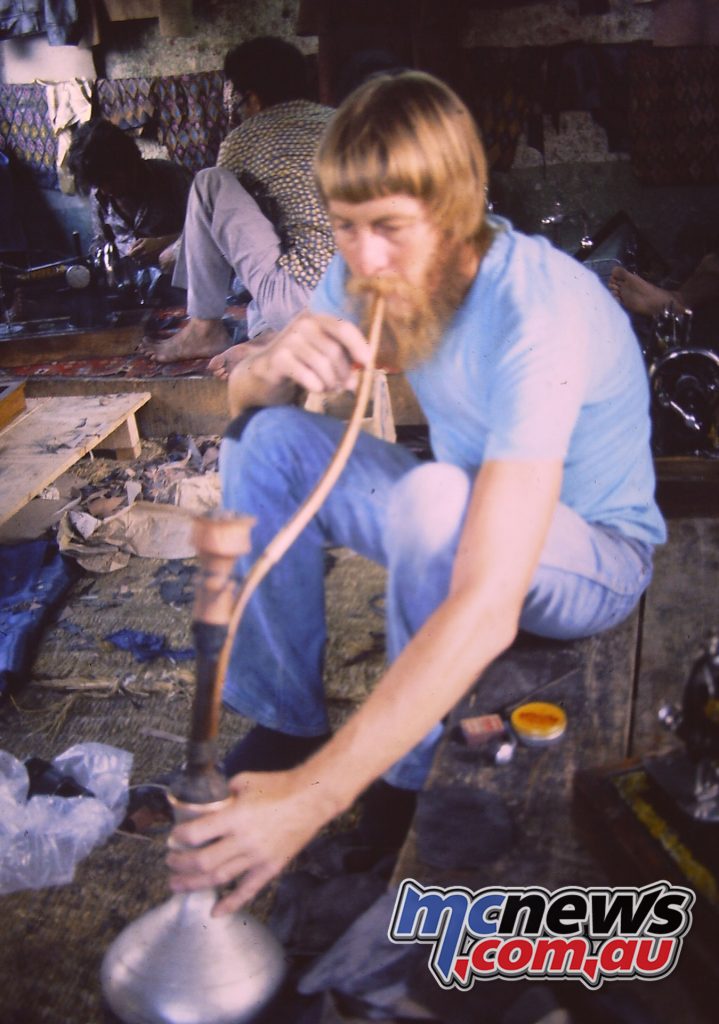
Charlie finally lost his temper and hit a young bloke who obstinately kept getting in his way. Not very hard, but I was concerned how the crowd would take it. They fell about laughing.
We crossed the border at the same time as an unbelievably well equipped party of British Army mountaineers. They were Royal Engineers returning after a few months in the Himalayas on full pay.
Could it be that there’s something to be said for the army after all? Indian Customs and immigration processed us politely, though not promptly – they weren’t together enough for that – while they bossed a motley crowd of hippies around rather brusquely. The Border Safari Suit Ploy works again!
Did you know that you can bribe your way through a border with a pen? Find out all about it next instalment.























